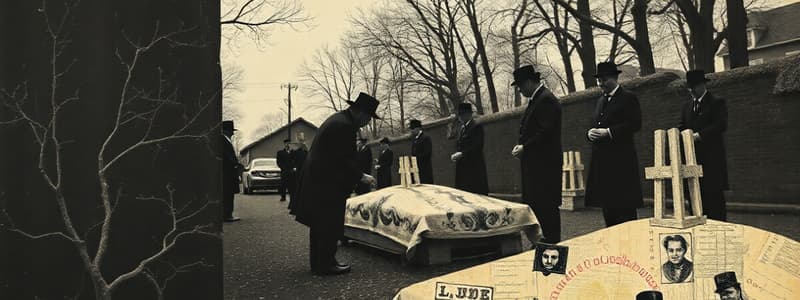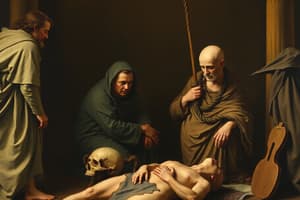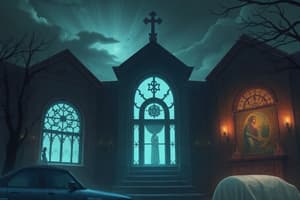Podcast
Questions and Answers
Explain how the dramaturgical perspective, as used by Turner and Edgley, reframes our understanding of grief in American funerals, beyond merely being a display of personal emotion.
Explain how the dramaturgical perspective, as used by Turner and Edgley, reframes our understanding of grief in American funerals, beyond merely being a display of personal emotion.
The dramaturgical perspective reframes grief as a socially constructed performance, managed through specific roles, scripts, and symbols, to maintain social order and reinforce cultural values, not just as raw individual emotion.
How do funeral directors balance the need for emotional expression with the maintenance of social decorum during funeral services, according to Turner and Edgley?
How do funeral directors balance the need for emotional expression with the maintenance of social decorum during funeral services, according to Turner and Edgley?
Funeral directors act as 'stage managers,' guiding families to express grief within socially acceptable boundaries by using specific language, actions, and settings to shape the emotional tone of the event.
Analyze how the selection and utilization of specific symbols (e.g., casket, flowers, attire) in American funerals contribute to the construction and reinforcement of cultural narratives surrounding death.
Analyze how the selection and utilization of specific symbols (e.g., casket, flowers, attire) in American funerals contribute to the construction and reinforcement of cultural narratives surrounding death.
Symbols serve as 'emotional tools,' communicating messages about the deceased's life, status, and beliefs, reinforcing cultural values and providing emotional closure for mourners by structuring grief expression.
In what ways do funerals in America reinforce social hierarchies or reflect existing social inequalities, based on the dramaturgical analysis presented by Turner and Edgley?
In what ways do funerals in America reinforce social hierarchies or reflect existing social inequalities, based on the dramaturgical analysis presented by Turner and Edgley?
Discuss the concept of 'deathwork' as it relates to the professional responsibilities of funeral directors, and explain its significance in shaping societal perceptions of death.
Discuss the concept of 'deathwork' as it relates to the professional responsibilities of funeral directors, and explain its significance in shaping societal perceptions of death.
How does the structured environment of a funeral provide a framework for emotional expression, and what are the potential drawbacks of such a regulated display of grief?
How does the structured environment of a funeral provide a framework for emotional expression, and what are the potential drawbacks of such a regulated display of grief?
Explain how the performative aspect of funerals, as described by Turner and Edgley, contributes to the continuity of cultural traditions related to death and mourning.
Explain how the performative aspect of funerals, as described by Turner and Edgley, contributes to the continuity of cultural traditions related to death and mourning.
Analyze how the roles of various participants in a funeral (e.g., clergy, family members, friends) contribute to the overall dramaturgy of the event and its intended emotional impact.
Analyze how the roles of various participants in a funeral (e.g., clergy, family members, friends) contribute to the overall dramaturgy of the event and its intended emotional impact.
How might the commercial aspects of funeral services influence or alter the authentic expression of grief and mourning, according to a dramaturgical perspective?
How might the commercial aspects of funeral services influence or alter the authentic expression of grief and mourning, according to a dramaturgical perspective?
Discuss the ways in which technology and evolving social norms are reshaping the dramaturgy of American funerals in the 21st century, with specific examples.
Discuss the ways in which technology and evolving social norms are reshaping the dramaturgy of American funerals in the 21st century, with specific examples.
Evaluate how the 'front stage' and 'back stage' dynamic, as described by Goffman, applies to funeral settings, particularly in the context of funeral directors' work.
Evaluate how the 'front stage' and 'back stage' dynamic, as described by Goffman, applies to funeral settings, particularly in the context of funeral directors' work.
Explain how the concept of 'impression management' is employed by mourners during a funeral and why it's crucial for maintaining social cohesion.
Explain how the concept of 'impression management' is employed by mourners during a funeral and why it's crucial for maintaining social cohesion.
In what ways do funeral rituals provide a sense of 'ontological security' for the bereaved, and how does this relate to the maintenance of social order?
In what ways do funeral rituals provide a sense of 'ontological security' for the bereaved, and how does this relate to the maintenance of social order?
What are some potential dysfunctions or unintended consequences of viewing funerals primarily as theatrical performances, both for individuals and for society?
What are some potential dysfunctions or unintended consequences of viewing funerals primarily as theatrical performances, both for individuals and for society?
How do funerals in different cultural contexts deviate from the American model described by Turner and Edgley, and what does this reveal about varying cultural attitudes toward death?
How do funerals in different cultural contexts deviate from the American model described by Turner and Edgley, and what does this reveal about varying cultural attitudes toward death?
Critically assess the claim that funerals primarily serve the needs of the living rather than honoring the dead, based on the insights from Turner and Edgley's dramaturgical analysis.
Critically assess the claim that funerals primarily serve the needs of the living rather than honoring the dead, based on the insights from Turner and Edgley's dramaturgical analysis.
Analyze the ethical implications of funeral directors actively shaping and managing mourners' emotional experiences, as highlighted in the concept of 'deathwork'.
Analyze the ethical implications of funeral directors actively shaping and managing mourners' emotional experiences, as highlighted in the concept of 'deathwork'.
How can a deeper understanding of the dramaturgical elements of funerals inform more compassionate and effective approaches to grief counseling and support?
How can a deeper understanding of the dramaturgical elements of funerals inform more compassionate and effective approaches to grief counseling and support?
Discuss any potential social changes that could lead to a significant shift away from traditional funeral practices in America, and how this might impact the way society deals with death and grief.
Discuss any potential social changes that could lead to a significant shift away from traditional funeral practices in America, and how this might impact the way society deals with death and grief.
What aspects of Erving Goffman's broader sociological theories are most relevant to understanding Turner and Edgley's analysis of funerals as theatrical performances?
What aspects of Erving Goffman's broader sociological theories are most relevant to understanding Turner and Edgley's analysis of funerals as theatrical performances?
Flashcards
Funerals as Performances
Funerals as Performances
Funerals are carefully planned performances with scripts and symbols that help people manage emotions, maintain social order, and reinforce cultural ideas about death and grief.
Roles in Funerals
Roles in Funerals
Individuals present themselves in specific ways, taking on roles such as funeral directors, clergy, and mourners, following expected behaviors.
Funeral Props
Funeral Props
Items such as caskets, flowers, and black clothing serve to strengthen the emotional and symbolic meaning of the funeral event.
Funeral Director's Role
Funeral Director's Role
Signup and view all the flashcards
Deathwork
Deathwork
Signup and view all the flashcards
Symbols in Funerals
Symbols in Funerals
Signup and view all the flashcards
Funeral's Impact on Memory
Funeral's Impact on Memory
Signup and view all the flashcards
Emotional Expectations
Emotional Expectations
Signup and view all the flashcards
Purpose of Funerals
Purpose of Funerals
Signup and view all the flashcards
Funerals and Social Structure
Funerals and Social Structure
Signup and view all the flashcards
Study Notes
- Funerals are analyzed as carefully planned performances using Erving Goffman's "life as theater" concept.
- Funerals follow specific scripts and use symbols to manage emotions, maintain social order, and reinforce cultural ideas about death and grief.
- Funerals help individuals navigate loss in a structured way, making death a socially meaningful event.
Viewing Funerals as a Performance
- Funerals exemplify people presenting themselves in specific ways based on the situation.
- Different individuals take on specific roles, following expected behaviors.
- Funerals are not just personal moments of grief but public events reflecting cultural values and beliefs about death.
- The funeral setting acts as a stage where actions are planned and performed according to societal expectations.
- The performance ensures death is acknowledged orderly and respectfully
Managing Behavior and Symbolic Elements
- Behavior is managed to create the right impression, honoring the deceased while maintaining a respectful atmosphere.
- Items like caskets, flowers, and black clothing serve as props, strengthening the emotional and symbolic meaning.
- The arrangement of seating, pacing of the ceremony, and order of speakers contribute to the theatrical nature.
- The theatrical nature reinforces its role as a structured ritual.
The Role of Funeral Directors
- Funeral directors act as stage managers to ensure everything goes smoothly.
- They take care of the body, arrange the service, and guide mourners.
- Funeral directors help families balance expressing grief and keeping the ceremony dignified.
- They use words, actions, and settings to create a mood of respect and sadness.
- The directors shape how people experience and understand death.
- Funeral director's ability to blend professionalism with compassion allows them to support grieving families while ensuring that social norms are followed.
Funeral Directors as Emotional Guides
- Funeral directors act as emotional guides during difficult moments, ensuring everything follows social expectations.
- "Deathwork" refers to the specialized labor performed by funeral professionals to manage grief and prepare the body.
- Deathwork maintains the emotional tone of the ceremony.
- Deathwork shapes how society understands and processes death.
Symbols and Rituals
- Funerals are full of symbols that help people make sense of death.
- Body display, music, eulogies, and rituals tell a story about the deceased’s life and legacy.
- These elements help the grieving process by giving mourners a way to say goodbye.
- Mourners feel connected to their cultural beliefs about death and the afterlife.
- Symbols act as emotional tools so that people can express their feelings in a structured way.
- Shared community values are reinforced
Shaping Memory and Meaning
- Burial location, funeral attire, and religious readings send messages about the person’s status and beliefs.
- The messages are about how they will be remembered.
- These elements influence public memory and provide emotional closure.
- Details like flower selection or eulogy phrasing contribute to the funeral’s overall meaning.
- Death is not just an individual experience but a collective event that shapes social identity.
Emotions and Expectations
- Mourners are expected to express grief in a certain, controlled way.
- Funerals create a structured setting where emotions are both displayed and controlled.
- Grief is channeled through ritual and tradition, ensuring it does not disrupt social stability.
Emotional Management and Social Scripts
- People adjust grief expression based on their relationship with the deceased and who is watching.
- Funeral directors and clergy give signals about the appropriate level of emotion.
- Grief should follow a social script.
- Individuals may feel pressured to conform to socially accepted mourning, even if their personal grief differs.
Purpose of Funerals
- Funerals bring people together, strengthen social bonds, and reinforce traditions.
- Society helps people process loss and maintain cultural beliefs about life and death by turning death into a performance.
- Funerals support the living and honor the dead.
- The structured nature of funerals comforts by giving mourners a familiar framework.
- The framework reduces uncertainty and reinforces the idea that life continues after loss.
Social Structures and Continuity
- Funerals reflect social structures, including class, religion, and cultural traditions.
- The service, attendance, and rituals show differences in social identity.
- Funerals provide a space to reconnect with family, friends, and community members.
- Funerals remind of the social connections that endure after death.
- Community ties and cultural continuity are reinforced.
Conclusion
- American funerals show how death is shaped by society through performance.
- Funerals are scripted events with assigned roles, rituals, and emotional expectations.
- The above factors highlight how society deals with grief and mortality.
- Funerals are public performances that maintain cultural traditions and provide emotional support.
- "Deathwork" emphasizes the behind-the-scenes labor that makes this performance possible.
- Professionals guide individuals through mourning while ensuring societal norms around death remain intact.
Studying That Suits You
Use AI to generate personalized quizzes and flashcards to suit your learning preferences.




